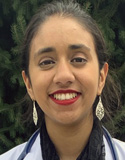Medical Student Leader Tackles Advocacy and Equity Work

Senila Yasmin
As Senila Yasmin began her third year as a Tufts University School of Medicine (TUSM) student this summer, she already had held leadership roles in multiple TUSM organizations, attended two national meetings of the American Medical Society (AMA), and
had sponsored three ground-breaking resolutions, two of which passed the Massachusetts Medical Society (MMS) House of Delegates. Within months, one of those resolutions reached the floor of the AMA House of Delegates and was passed.
Before medical school, Yasmin received a master’s in public health from Boston University, where she previously earned a BA in biology. As a medical student, she quickly joined the MMS and the AMA as she discovered that organized medicine was an avenue
for combining her interests in public health, medicine, and policy.
She has since served as a student member of the MMS Committee on Diversity in Medicine and the chair of the TUSM AMA/MMS chapter. She has also been active in a TUSM First Generation in Medicine (FGIM) student mentorship group. And, she was instrumental
in organizing successful MMS networking events earlier this year for students from across the state and physicians.
In June, Yasmin was elected to the MMS Board of Trustees — a new vantage point for her expanding view and participation in organized medicine.
VS: How did your MMS resolution for more culturally sensitive attire in hospitals come about?
Yasmin: I was shadowing in the OB-GYN department, and the hospital-required scrubs for the OR had a deep neckline and short sleeves. As a Muslim woman, I wanted a longer sleeve length and a higher neckline, so I purchased
my own scrubs. That extra step made the OR feel not very inclusive. It felt like there were barriers that kept diverse women out of certain specialties. Within a few months, I’d done much of the work to write a resolution calling for the MMS
to advocate for the provision of safe, culturally and religiously sensitive operating room scrubs for both patients and employees.
VS: How did you get involved in the resolution for MMS to advocate for medical schools to remove legacy admissions practices?
Yasmin: I inherited this from another student, MMS member Christoph Baker, MD. Before he graduated, he worked with Tufts professional schools to remove legacy admissions. I got involved with his work, bringing in my policy
interests against a practice that is inherently racist and classist. We need to make sure there are diverse voices at the table in medicine. The resolution calls for the MMS to oppose the use of legacy admissions. But change requires more
than making statements. We need to be more intentional to bring down barriers. Removing questions about family legacy in the admissions process is one way. We introduced a similar resolution to the AMA that passed at the AMA House of Delegates
in June after many hurdles.
VS: From your experience, what are the necessary ingredients or actions to bring about change?
Yasmin: You must show that an issue is important and worth our organization’s time. When it comes to equity and diversifying medicine, I’ve had to work hard to convince people to put our money where our mouth is, especially
on an issue that won’t show results quickly. It is challenging to convince people to see the long-term benefits. It is important to talk to others, especially at networking events to find the right people. Getting media attention and having
a social media presence are also important. And you need to stay dedicated and focused. All this is easier if you are addressing a topic that you really care about.
VS: What would you like other medical students to know about
the MMS?
Yasmin: It’s my belief — and something that my favorite Public Health professor, the late David K. Jones, said — that we as future physicians can have an influential role in society and should be taking a more active role
in policy. If you are a medical student who has a matter near and dear to your heart, working through the MMS is a great way to bring it to the forefront. There is a place for everyone to get involved at the MMS. Our Medical Student Section
is very robust, and you interact with students from other schools. There are a lot of incentives for joining and getting involved in the MMS.
